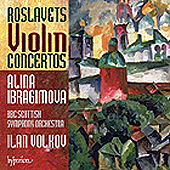
ESSENTIAL RECORDINGS

Nikolay Roslavets, lived from 1881 to 1944, pretty well during the same period that Rachmaninov was around. Imagine how Violin Concertos composed by Rachmaninov would sound: melodramatic melodies, expansive and gripping climaxes, dark and melancholic slow movements, etc...real crowd pleasers just like his Piano Concertos. Now, completely obliterate that sound from your mind because the music of Roslavets is very far removed from the sound world of Rachmaninov. It is more like a combination of Arnold Schoenberg and William Schuman. Describing himself as 'extreme left-wing', from early on he was associated with the Russian avant-garde and was a committed modernist.
His music is at first challenging because it never really offers a thematic focus or a strong harmonic core. It is very tonally chromatic and restless in its treatment of subject matter. The Violin Concerto No. 1 from 1925, uses a technique of 'synthetic' chords that he developed from studying the late works of Scriabin. It is difficult to digest at first listen, but after a while it reveals its sense of direction and purpose, and becomes a very interesting work. It stands as one of the most important Russian compositions of that era.
To my ears, the Violin Concerto No. 2, dating from 1936 is much more focused thematically, employs a more expansive orchestration, and delivers a cleaner, less contrived piece as a whole. But, after the 'Pravda' denunciations against musical modernism in January of that year, he thought it would never get performed in public. In fact, the performance on this recording is a world premiere.
The young violinist Alina Ibragimova handles all the intricate challenges imprinted in this music with aplomb, and always delivers a clear, singing tone, even during the thorniest moments.
Works like these, by non-conformist composers, are difficult to absorb and understand at first. But, after a few focused listens, with the proper frame of mind, they sometimes become more impressive than old favorites, and leave you musically satisfied. After all, if all Violin Concertos sounded like the famous Mendelssohn for example, what would be the point. And again, hats off to Hyperion for offering us new and uncharted works, that given time, will themselves become old favorites.
Jean-Yves Duperron